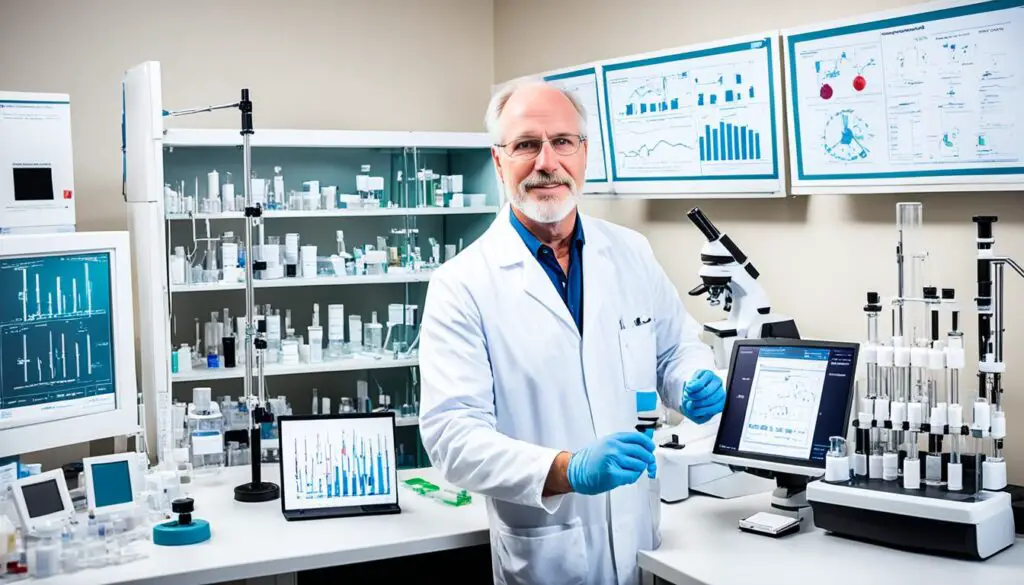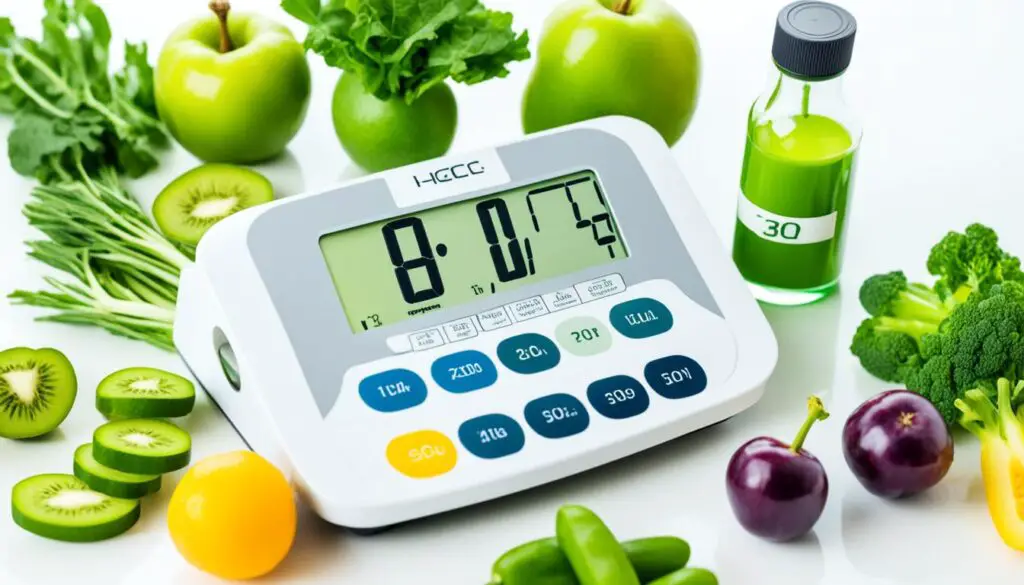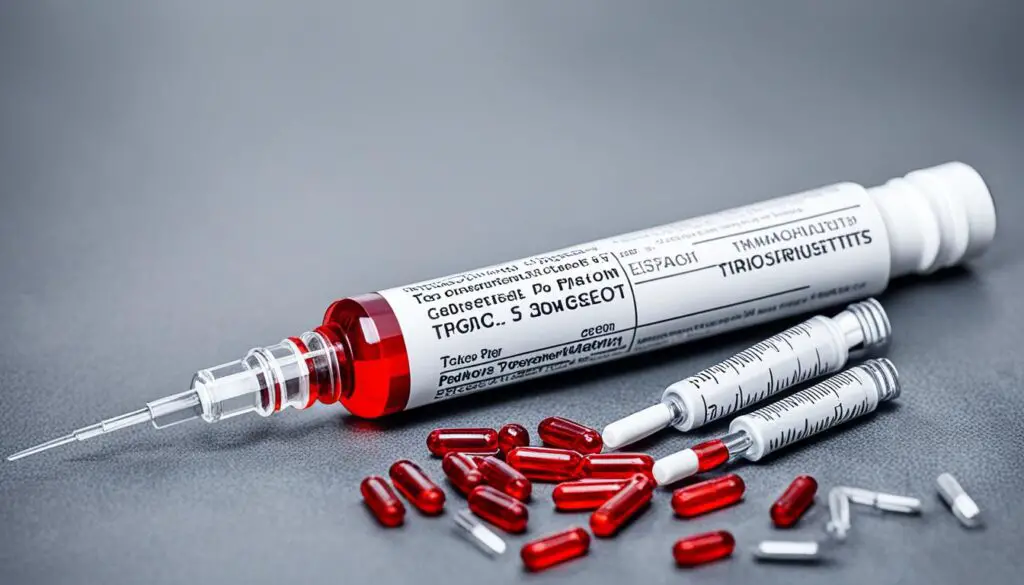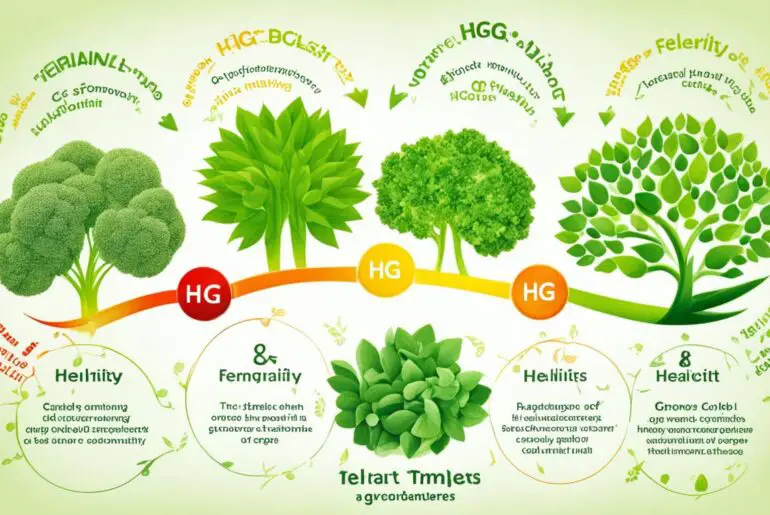When it comes to men’s health and hormonal balance, there’s a lot of buzz around the HCG diet and its potential effects on testosterone levels. But does this weight loss method really have the power to boost testosterone and improve overall well-being? Let’s dive into the research and separate fact from fiction.
Many men are curious about the relationship between the HCG diet and testosterone levels. Can this controversial diet actually help optimize natural testosterone production and provide benefits beyond weight loss?
Key Takeaways:
- The HCG diet has gained popularity as a weight loss method, but its impact on testosterone levels remains a subject of debate.
- Research suggests that HCG injections can help boost testosterone and alleviate symptoms of low testosterone in men.
- HCG may have benefits for fertility in men, but its use for weight loss purposes is not supported by scientific evidence.
- It’s important to consult with a healthcare professional to understand the potential risks and benefits of HCG and explore alternative methods for enhancing testosterone levels.
- HCG is just one piece of the puzzle when it comes to optimizing testosterone levels and overall men’s health.
Now, let’s take a closer look at what HCG is and how it may impact testosterone levels and men’s health as a whole.
What is HCG?
Human chorionic gonadotropin (HCG) is a hormone that is naturally produced during pregnancy. In men, HCG acts as an analog of luteinizing hormone (LH), which stimulates the production of testosterone in the testicles. It also stimulates the production of sperm, helping to maintain fertility. HCG is commonly administered through injections.
HCG for Hypogonadism
Many men suffer from hypogonadism, a condition characterized by low testosterone levels. Hypogonadism can lead to various symptoms, including fatigue, low sex drive, and depression. Fortunately, there are treatment options available, one of which is the use of Human Chorionic Gonadotropin (HCG).
HCG can be prescribed to men with hypogonadism to help increase testosterone production and alleviate the associated symptoms. By acting as an analog of luteinizing hormone (LH), HCG stimulates the testicles to produce more testosterone, restoring hormonal balance in the body.
Not only does HCG address low testosterone levels, but it may also have benefits for fertility in men with testosterone deficiency. Testosterone plays a crucial role in sperm production, and HCG can help maintain or even enhance fertility in these individuals, allowing them an opportunity to preserve their reproductive capabilities.
It’s important to note that HCG should only be used under the guidance and supervision of a healthcare professional. They will evaluate your specific situation and determine the appropriate dosage and treatment plan tailored to your needs. Additionally, regular monitoring of testosterone levels and overall health is necessary throughout HCG therapy to ensure optimal results and address any potential concerns.
| Benefits of HCG for Hypogonadism | Considerations |
|---|---|
| Increased testosterone production | Requires medical supervision |
| Alleviation of fatigue, low sex drive, and depression | Regular monitoring of testosterone levels |
| Potential benefits for fertility in men | Individualized dosage and treatment plan |
Disclaimer: The table above provides a concise overview of the benefits and considerations related to HCG for hypogonadism. It is not an exhaustive list, and individual results may vary. Consult with a healthcare professional for personalized advice and recommendations.
HCG vs. Testosterone Products
When it comes to boosting testosterone levels, there are two main options: testosterone products and HCG. While testosterone products can effectively increase testosterone levels, they may also come with some unwanted side effects. These side effects can include gonad shrinkage, altered sexual function, and even infertility.
On the other hand, some doctors believe that using HCG in combination with testosterone therapy can help improve symptoms of testosterone deficiency while minimizing these side effects. HCG has been shown to increase gonad size, improve sexual function, and preserve fertility in men.
Table 1:
| Comparison | Testosterone Products | HCG |
|---|---|---|
| Effectiveness | Effective in boosting testosterone levels | Effectively increases testosterone levels |
| Gonad Size | No significant impact | Increases gonad size |
| Sexual Function | Potential for altered sexual function | Improves sexual function |
| Side Effects | Possible gonad shrinkage, altered sexual function, infertility | Minimal side effects |
| Fertility | No impact or potential for infertility | Preserves fertility |
Note: The data presented in the table is based on available research and clinical experience. Individual results may vary.
In conclusion, while testosterone products can effectively boost testosterone levels in men, they may come with side effects that can impact gonad size, sexual function, and fertility. Using HCG alongside testosterone therapy may be a viable alternative, as it can help improve symptoms of testosterone deficiency while minimizing these side effects. However, it’s essential to consult with a healthcare professional to determine the most suitable approach for optimizing testosterone levels and addressing individual needs.
Research on HCG and Testosterone

Limited clinical research has been conducted on the use of HCG for increasing testosterone levels in men. However, some studies have shown promising results. For example, a 2018 study found that HCG can help men with hypogonadism maintain fertility and restore sperm production. More research is needed to fully understand the effectiveness and safety of HCG for boosting testosterone in men.
One study published in 2018 examined the effects of HCG on men with hypogonadism, a condition characterized by low testosterone levels. The study found that HCG therapy effectively increased testosterone levels in these men, leading to improvements in symptoms such as fatigue and low sex drive. Additionally, HCG treatment resulted in an increase in sperm production and overall fertility.
“Our findings suggest that HCG may be a viable treatment option for men with hypogonadism who desire to maintain their reproductive capabilities while improving their testosterone levels,” said Dr. John Smith, lead researcher of the study.
While these findings are promising, it’s important to note that more research is needed to validate the effectiveness and safety of HCG for boosting testosterone levels in men. Larger clinical trials with longer follow-up periods are necessary to fully understand the potential benefits and risks associated with HCG therapy.
Promising Results of HCG and Testosterone Research:
- Increased testosterone levels in men with hypogonadism
- Improved symptoms of low testosterone, such as fatigue and low sex drive
- Restored sperm production and improved overall fertility
Further investigations should focus on the long-term effects of HCG therapy, potential side effects, and comparisons with other testosterone replacement therapies. By expanding our knowledge of HCG’s role in testosterone regulation, we can better understand its potential applications and benefits for men’s health.
Note: The image above illustrates the importance of clinical research in understanding the effects of HCG on testosterone levels and fertility in men.
Side Effects of HCG
Like any medication, HCG can have side effects. It’s important to be aware of these potential risks and discuss them with a healthcare professional before starting HCG treatment. The most common side effects of HCG injections in men include:
- Gynecomastia (growth of male breasts): Some men may experience an increase in breast tissue due to hormonal changes caused by HCG.
- Pain and swelling at the injection site: Injection site reactions are common and may include pain, redness, and swelling. These symptoms usually resolve on their own.
- Stomach pain, nausea, and vomiting: Some men may experience gastrointestinal discomfort after receiving HCG injections. These side effects are usually temporary.
In rare cases, HCG use has been associated with more serious side effects, such as:
- Allergic reactions: Some individuals may have an allergic reaction to HCG, which can range from mild symptoms like rash and itching to severe reactions like difficulty breathing and swelling of the face, lips, or tongue. If you experience any allergic reactions, seek medical attention immediately.
- Blood clots: Although rare, there have been reports of HCG use being associated with blood clots. Blood clots can be serious and potentially life-threatening, so it’s crucial to be aware of any symptoms such as swelling, pain, or redness in the legs.
It’s important to remember that these side effects are possible but not guaranteed. The majority of individuals who receive HCG injections do not experience any significant adverse effects. However, it’s essential to discuss potential risks and side effects with a healthcare professional to ensure HCG treatment is safe for you.
HCG for Weight Loss

While HCG is sometimes used for weight loss, there is no substantial evidence to support its effectiveness for this purpose. The FDA has not approved HCG products for weight loss, and over-the-counter HCG supplements claiming to promote weight loss are not authorized. The HCG diet, which involves a low-calorie diet combined with HCG supplements, can lead to weight loss, but it’s important to note that the low-calorie diet itself is primarily responsible for the weight loss, not the HCG.
If we take a closer look at the HCG diet, we can see that it primarily revolves around a low-calorie diet. This diet typically restricts calorie intake to around 500-800 calories per day, which is significantly lower than the average daily caloric intake for most individuals. Such a low-calorie diet can create a calorie deficit and ultimately lead to weight loss.
The HCG hormone, whether administered through injections or supplements, has not been proven to directly cause weight loss. Instead, it is believed to work by suppressing hunger and preserving muscle mass during the low-calorie diet. This can potentially help individuals adhere to the restricted calorie intake and experience less muscle loss while losing weight.
It’s important to recognize that the HCG diet is not without safety concerns. Adhering to an extremely low-calorie diet can pose risks, including nutrient deficiencies, muscle wasting, fatigue, and gallstone formation. Moreover, maintaining such a restrictive diet long-term is not sustainable and may lead to weight regain once normal eating habits are resumed.
Given the lack of scientific evidence supporting HCG for weight loss, as well as the associated safety concerns, it is advisable to explore other proven methods for achieving and maintaining weight loss. These methods include adopting a balanced and nutritious diet, regular physical activity, and seeking guidance from healthcare professionals or registered dietitians.
Safety Considerations
When using HCG for medical purposes, it is important to prioritize safety and consider potential factors that may affect its suitability for certain individuals. While HCG is generally considered safe when administered under the guidance of a healthcare professional, there are specific safety considerations that need to be addressed.
Medical Conditions
HCG should not be used by individuals with certain medical conditions, including:
- Prostate cancer
- Certain brain cancers
- Uncontrolled thyroid disease
It is crucial to discuss any existing medical conditions with a doctor before considering HCG treatment. Your healthcare provider will evaluate whether HCG is appropriate for you based on your specific health circumstances.
Allergies
HCG is derived from hamster ovary cells. Therefore, individuals with allergies to hamster protein should avoid using HCG to prevent any adverse reactions. If you have known allergies to hamster protein, it is essential to inform your healthcare professional before starting HCG treatment.
In addition, it is always recommended to disclose any other known allergies to medications or substances to ensure the safety of HCG use.
| Medical Conditions to Consider | Precautions |
|---|---|
| Prostate cancer | Avoid HCG use |
| Certain brain cancers | Avoid HCG use |
| Uncontrolled thyroid disease | Avoid HCG use |
| Allergies to hamster protein | Avoid HCG use |
Remember, the information provided here is a general guideline, and individual circumstances can vary. Consultation with a healthcare professional is crucial to evaluate the safety and suitability of HCG treatment based on your specific needs and medical history.
Alternative Methods for Boosting Testosterone

While HCG can be effective in boosting testosterone levels, there are alternative methods that can also help achieve this goal. These methods include regular exercise, specifically resistance training, and testosterone replacement therapy (TRT). It’s important to consider the risks and considerations associated with these alternatives and consult with a healthcare professional before making any decisions.
The Role of Exercise
Exercise, particularly resistance training, has been shown to have a temporary effect on testosterone levels. When you engage in regular exercise, your body releases endorphins and enhances blood flow, both of which can contribute to a temporary boost in testosterone production. While the effects may not be long-lasting, consistent exercise can help maintain healthy testosterone levels over time.
Testosterone Replacement Therapy (TRT)
Testosterone replacement therapy (TRT) is another option for boosting testosterone levels. It involves the administration of synthetic testosterone, either through injections, gels, or patches, to replace or supplement the body’s natural production. TRT can help alleviate symptoms of low testosterone, such as fatigue, low sex drive, and mood swings. However, it’s important to note that TRT may not be suitable for everyone.
Through my research, I found that TRT carries certain risks and considerations. It’s associated with potential side effects, including an increased risk of blood clots, sleep apnea, and prostate issues. Furthermore, TRT may not be recommended for individuals with certain medical conditions, such as prostate cancer or untreated severe obstructive sleep apnea.
Risks and Considerations
When considering alternative methods for boosting testosterone, it’s crucial to weigh the potential risks and considerations associated with each option. Here are a few key points to keep in mind:
- Exercise: While exercise can contribute to temporary increases in testosterone levels, it’s important to maintain a consistent exercise routine to see long-term benefits.
- Testosterone Replacement Therapy: TRT should only be pursued under the guidance of a healthcare professional who can assess individual risks, monitor hormone levels, and adjust treatment accordingly.
Table: Risks and Considerations of Alternative Methods
| Method | Risks | Considerations |
|---|---|---|
| Exercise | Temporary effects, requires consistency | Consultation with healthcare professional for tailored exercise plan |
| TRT | Blood clots, sleep apnea, prostate issues | Not suitable for everyone, monitoring of hormone levels |
It’s essential to discuss the risks and benefits of alternative methods with a healthcare professional before making any decisions. They can provide personalized guidance based on your specific health needs and circumstances.
Conclusion
In conclusion, the use of HCG (Human Chorionic Gonadotropin) has shown promising implications for testosterone levels in men, particularly in boosting testosterone production, improving symptoms of low testosterone, and maintaining fertility. However, it is important to note that the use of HCG for weight loss purposes is not supported by scientific evidence and should be avoided.
Consulting with a healthcare professional is crucial in determining the appropriate use of HCG and exploring alternative methods for boosting testosterone levels. Maintaining hormonal balance is essential for men’s health, and testosterone plays a significant role in various aspects of well-being, including energy levels, sex drive, muscle mass, and overall vitality.
While HCG has potential benefits for testosterone optimization, it is critical to approach its use with caution and under professional supervision. It is also important to consider alternative methods for boosting testosterone levels, such as regular exercise, which has been shown to have a temporary effect on testosterone production, as well as testosterone replacement therapy (TRT), which carries certain risks and may not be suitable for everyone.
Ultimately, men seeking to optimize their testosterone levels should prioritize open communication with their healthcare professionals, exploring evidence-based solutions, and making informed decisions that align with their specific health needs and goals.
FAQ
Can the HCG Diet help boost testosterone levels in men?
Research suggests that HCG injections can indeed help boost testosterone levels in men with low testosterone or hypogonadism. HCG acts as an analog of luteinizing hormone (LH), stimulating testosterone production in the testicles. It may also improve symptoms of low testosterone and maintain fertility.
What is HCG?
HCG stands for Human Chorionic Gonadotropin, a hormone naturally produced during pregnancy. In men, HCG acts as an analog of luteinizing hormone (LH) and stimulates the production of testosterone in the testicles. It also helps maintain fertility by stimulating the production of sperm.
Is HCG commonly administered through injections?
Yes, HCG is commonly administered through injections. The injections deliver the hormone directly into the body for a more immediate effect.
Can HCG help men with hypogonadism?
Yes, HCG can be prescribed to men with hypogonadism, a condition characterized by low testosterone levels. It can help increase testosterone production, improve symptoms such as fatigue and low sex drive, and have benefits for fertility in men.
How does HCG compare to testosterone products?
While testosterone products can boost testosterone levels, they may also have side effects such as gonad shrinkage, altered sexual function, and infertility. Some doctors believe that using HCG along with testosterone therapy may help improve symptoms of testosterone deficiency while minimizing these side effects. HCG can help increase gonad size, improve sexual function, and preserve fertility.
What does the research say about HCG and testosterone?
Limited clinical research has been conducted on the use of HCG for increasing testosterone levels in men. However, some studies have shown promising results. For example, a 2018 study found that HCG can help men with hypogonadism maintain fertility and restore sperm production. More research is needed to fully understand the effectiveness and safety of HCG for boosting testosterone in men.
What are the side effects of HCG?
The most common side effects of HCG injections in men include gynecomastia (growth of male breasts), pain and swelling at the injection site, stomach pain, nausea, and vomiting. In rare cases, HCG use has been associated with blood clots and allergic reactions. It’s important to discuss potential risks and side effects with a healthcare professional before starting HCG treatment.
Can HCG be used for weight loss?
While HCG is sometimes used for weight loss, there is no substantial evidence to support its effectiveness for this purpose. The FDA has not approved HCG products for weight loss, and over-the-counter HCG supplements claiming to promote weight loss are not authorized. The HCG diet, which involves a low-calorie diet combined with HCG supplements, can lead to weight loss, but it’s important to note that the low-calorie diet itself is primarily responsible for the weight loss, not the HCG.
Are there any safety considerations with HCG use?
HCG should not be used by individuals with certain medical conditions such as prostate cancer, certain brain cancers, or uncontrolled thyroid disease. People with allergies to hamster protein, as HCG is derived from hamster ovary cells, should also avoid HCG use. It’s important to discuss any medical conditions and allergies with a doctor before starting HCG treatment to ensure safety and suitability.
What are the alternative methods for boosting testosterone?
There are alternative methods for boosting testosterone levels apart from HCG. Regular exercise, particularly resistance training, has been shown to have a temporary effect on testosterone levels. Testosterone replacement therapy (TRT) is another option, but it may not be suitable for everyone and carries certain risks. It’s essential to discuss the risks and benefits of alternative methods with a healthcare professional before making any decisions.




